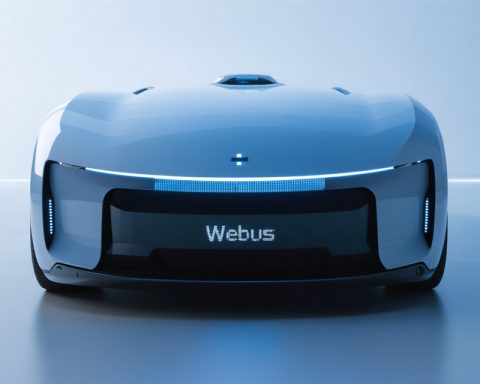Market Reaction to Meta’s Bold Announcements
Nvidia Corp. (NVDA) experienced a notable decline in its stock price, dropping 1.78% to close at $144.60 this past Friday morning, reflecting market anxiety amid fierce competition in the AI landscape. This downturn came shortly after Meta Platforms (META) CEO Mark Zuckerberg articulated an ambitious vision for the future of artificial intelligence.
In a recent public post, Zuckerberg emphasized that 2025 will be a pivotal year for AI, as he revealed the company’s plans to develop the advanced AI model Llama 4. To support this initiative, Meta will allocate dedicated AI engineers focused on research and development. A significant aspect of this strategy includes the introduction of 1GW of computational power set to launch in 2025.
The tech giant also announced expansive investments in infrastructure, committing to a data center that will exceed 2GW capacity and house over 1.3 million GPUs by the year’s end. With a staggering projected budget of $60 to $65 billion in capital expenditures for 2025, Meta aims not only to enhance its core services but also to fortify American leadership in technology.
As AI capabilities continue to escalate, Meta’s plans signal an increasing demand for GPUs, underscoring Nvidia’s critical role in this evolving landscape. This strategic shift highlights a competitive environment, reinforcing the urgency for Nvidia to innovate and adapt.
Broader Implications of Meta’s AI Developments
The rapid advancement of artificial intelligence is becoming a cornerstone of both tech innovation and economic dynamism. Meta’s ambitious strategy not only indicates a significant shift within its operational focus but also resonates through the larger fabric of global technology culture and the economy. As companies like Meta invest heavily in AI, they set a precedent that could lead to an arms race in technological capabilities, potentially redefining competitive landscapes.
The rise of AI initiatives has profound implications for the workforce. As more organizations embrace automation powered by advanced AI, there could be disruptions in employment, demanding a reevaluation of skillsets across various sectors. Jobs that were once thought to be secure may be at risk, prompting society to adapt to a new reality where continuous learning and re-skilling become paramount.
Environmentally, as data centers proliferate and computational demands escalate, there is an increasing concern regarding their carbon footprint. The energy consumption associated with vast server farms—projected to house millions of GPUs—could strain local resources and contribute to climate change if not mitigated with renewable energy solutions. The tech industry must prioritize sustainability to balance innovation with responsibility.
Looking ahead, future trends suggest an inevitable integration of AI into everyday life, impacting everything from healthcare to transportation. As Meta and its competitors push the boundaries of what is possible with AI, the potential for transformative change in society is vast, making it essential to consider both the innovative benefits and the ethical implications that follow. The long-term significance of these developments extends beyond economics; they hold the power to reshape our cultural landscape and societal values in the coming decades.
Meta’s AI Revolution: Will It Reshape the Tech Landscape?
Market Reaction to Meta’s Bold Announcements
Meta Platforms (META) has made waves in the tech industry with recent announcements that outline its ambitious future in artificial intelligence (AI). The company’s CEO, Mark Zuckerberg, shared a vision that intends to position Meta as a leader in AI technology, setting the stage for a potential redefinition of the competitive landscape.
Key Features of Meta’s AI Strategy
1. Introduction of Llama 4:
– Meta is gearing up to launch its latest AI model, Llama 4, which promises unprecedented capabilities. This move follows a series of successful iterations of their AI model, indicating a strong commitment to performance enhancement and innovation.
2. Substantial Infrastructure Investment:
– The company plans to invest between $60 to $65 billion in capital expenditures for 2025, focusing on expanding its AI infrastructure. This includes the development of a data center designed to surpass 2GW in capacity and the integration of over 1.3 million GPUs, which will drive computational power for AI applications.
3. Boosting Computational Power:
– A crucial component of Meta’s strategy is the introduction of an additional 1GW of computational power aimed for launch in 2025. This significant enhancement is expected to facilitate the deployment of advanced AI solutions across Meta’s platforms.
Market Dynamics and Competitor Response
The announcement has elicited varied reactions across the market. Stocks of competitors, like Nvidia Corp. (NVDA), dropped significantly (1.78% decline to close at $144.60). This decline underscores market anxieties surrounding fierce competition in the AI sector, particularly as companies scramble to harness the growing demand for AI technologies.
Pros and Cons of Meta’s AI Direction
Pros:
– Leadership in AI: With substantial investment, Meta is positioning itself as a pioneer in the AI field, potentially leading to groundbreaking innovations.
– Economic Growth: By bolstering its technological capabilities, Meta can contribute to job creation and economic growth in America, particularly in tech-focused regions.
Cons:
– High Financial Risk: The significant investment carries the risk of not yielding expected returns, particularly if industry competition remains fierce.
– Operational Challenges: Scaling infrastructure and integrating advanced technologies can pose operational hurdles that may hinder progress.
Sustainability and Innovations
As Meta advances its AI ambitions, sustainable practices become increasingly critical. The company is expected to prioritize energy-efficient technology in its data centers, aligning with global efforts to reduce carbon footprints and enhance sustainability.
Predictions and Market Insights
With Meta’s aggressive plans for AI development, industry experts predict a transformational shift in how tech companies approach innovation. The competition between giants like Meta and Nvidia will likely intensify, prompting faster advancements and more groundbreaking products across the board.
In conclusion, Meta’s strategic focus on AI positions it to potentially redefine not only its trajectory but also the broader landscape of technology. As the competition heats up, stakeholders will be closely monitoring developments, particularly in the deployment of new AI models and computational capabilities.
For more insights into technology trends and innovation, visit TechCrunch.








